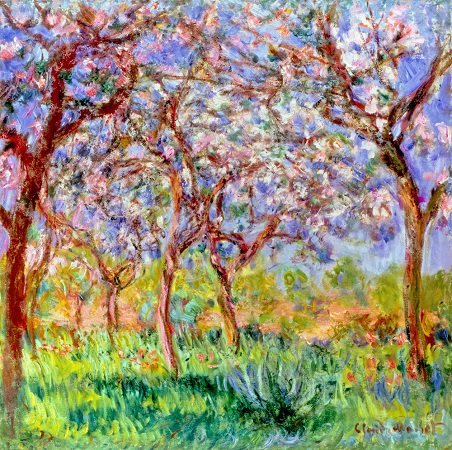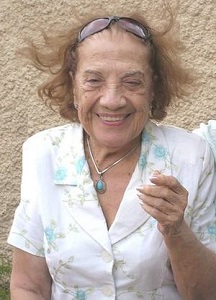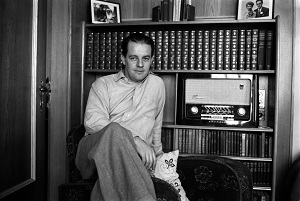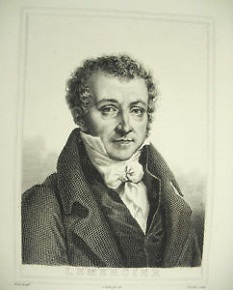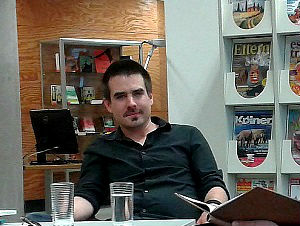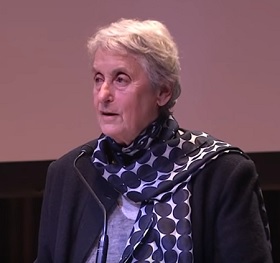De Britse schrijfster Charlotte Brontë werd geboren in Thornton op 21 april 1816. Zie ook alle tags voor Charlotte Brontë op dit blog.
Uit: Jane Eyre
“He listened very gravely; his face, as I went on, expressed more concern than astonishment; he did not immediately speak when I had concluded.
“Shall I call Mrs. Fairfax?” I asked.
“Mrs. Fairfax? No; what the deuce would you call her for? What can she do? Let her sleep unmolested.”
“Then I will fetch Leah, and wake John and his wife.”
“Not at all: just be still. You have a shawl on. If you are not warm enough, you may take my cloak yonder; wrap it about you, and sit down in the arm-chair: there, — I will put it on. Now place your feet on the stool, to keep them out of the wet. I am going to leave you a few minutes. I shall take the candle. Remain where you are till I return; be as still as a mouse. I must pay a visit to the second storey. Don’t move, remember, or call any one.”
He went: I watched the light withdraw. He passed up the gallery very softly, unclosed the staircase door with as little noise as possible, shut it after him, and the last ray vanished. I was left in total darkness. I listened for some noise, but heard nothing. A very long time elapsed. I grew weary: it was cold, in spite of the cloak; and then I did not see the use of staying, as I was not to rouse the house. I was on the point of risking Mr. Rochester’s displeasure by disobeying his orders, when the light once more gleamed dimly on the gallery wall, and I heard his unshod feet tread the matting. “I hope it is he,” thought I, “and not something worse.”
He re-entered, pale and very gloomy. “I have found it all out,” said he, setting his candle down on the washstand; “it is as I thought.”
“How, sir?”
He made no reply, but stood with his arms folded, looking on the ground. At the end of a few minutes he inquired in rather a peculiar tone —
“I forget whether you said you saw anything when you opened your chamber door.”
“No, sir, only the candlestick on the ground.”
“But you heard an odd laugh? You have heard that laugh before, I should think, or something like it?”
“Yes, sir: there is a woman who sews here, called Grace Poole, — she laughs in that way. She is a singular person.”
“Just so. Grace Poole — you have guessed it. She is, as you say, singular — very. Well, I shall reflect on the subject. Meantime, I am glad that you are the only person, besides myself, acquainted with the precise details of to-night’s incident. You are no talking fool: say nothing about it. I will account for this state of affairs” (pointing to the bed): “and now return to your own room. I shall do very well on the sofa in the library for the rest of the night. It is near four: — in two hours the servants will be up.”

Charlotte Brontë (21 april 1816 – 31 maart 1855)
Charlotte Gainsbourg (Jane) en William Hurt (Edward) in de gelijknamige film uit 1996
De Franse schrijver Patrick Rambaud werd geboren op 21 april 1946 in Parijs. Zie ook alle tags voor Patrick Rambaud op dit blog.
Uit: La Bataille
“Le maréchal Lannes était fatigué par quinze ans de combats et de dangers. Il venait de conduire l’affreux siège de Saragosse. Riche, marié à la plus belle et à la plus discrète des duchesses de la cour, fille d’un sénateur, il aurait voulu se retirer en famille dans sa Gascogne, voir grandir ses deux fils. Il était las de partir sans jamais savoir s’il reviendrait autrement que dans une caisse. Pourquoi l’Empereur lui refusait-il cette tranquillité ? Comme lui, la plupart des maréchaux n’aspiraient qu’à la paix des champs. Ces aventuriers, avec le temps, devenaient bourgeois. A Savigny, Davout construisait des huttes en osier pour ses perdreaux et à quatre pattes il leur donnait du pain ; Ney et Marmont adoraient jardiner ; MacDonald, Oudinot, ne se trouvaient à l’aise qu’entourés de leurs villageois ; Bessière chassait sur ses terres de Grignon s’il ne jouait avec ses enfants. Quant à Masséna, il disait de sa propriété de Rueil, qui regardait la Malmaison proche où se retirait l’Empereur : “D’ici, je peux lui pisser dessus !” Sur un ordre, ils étaient venus en Autriche, à la tête de troupes disparates et jeunes, qu’aucun motif puissant ne poussait à tuer. L’Empire déclinait déjà et n’avait que cinq ans. Ils le sentaient. Ils suivaient encore.
Lannes passait vite de la colère à l’ affection. Un jour il écrivait à sa femme que l’Empereur était son pire ennemi: «Il n’aime que pa boutade, quand il a besoin de vous » ; puis Napoléon le comblait de faveurs et ils se tombaient dans les bras. Leurs sorts restaient liés. Il y avait peu, dans les escarpements difficiles d’ une sierra espagnole, l’Empereur s’était cramponné à son bras.
À pied, dans la neige qui les giflait en tempête, avec leurs hautes botte en cuir, ils dérapaient.
Ensemble ils avaient enfourché la volée d’un canon, et des grenadiers les avaient hissés comme sur un traîneau au sommet du col de Guadarrama.”
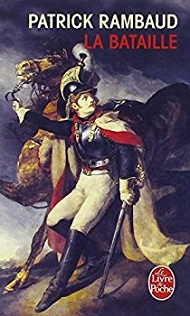
Patrick Rambaud (Parijs, 21 april 1946)
Cover
De Engelse schrijver John Mortimer werd geboren op 21 april 1923 in Londen. Zie ook alle tags voor John Mortimer op dit blog.
Uit: Rumpole and the Brave New World
“I don’t see why not.”
“We do our best to live through the trivialities of existence and get to the deeper understanding, then we go off to a little place in Chelsea for a light meal. Do you think your husband would understand it?”
“Not at all, but that won’t stop me joining you.”
“They will be enormously grateful. They’ve never met anyone who lived so near the Great Truth as you seem to do. We’ll make a date, Mrs Rumpole. You must shed your light in as many dark holes as possible.”
……..
The Rumpole practice in those days could be described as “jogging along”. The mantelpiece wasn’t entirely empty of briefs but they were of an unexciting and predictable variety. There was the case of Harry Timson, whose normally peaceful course of breaking and entering had become revealed to the authorities. This was owing to information, he strongly suspected, that was supplied by his cousin Percy, when he’d found himself in trouble over a quantity of stolen fish dinners. Such disloyalty was rare among the Timsons and Harry was pained by his cousin’s behaviour.
While I was thinking these matters over at dinner in the kitchen in Froxbury Mansions (a couple of chops and boiled potatoes), I noticed Hilda looking at me in a strange and thoughtful manner. After a while she got up with a tea towel in her hand and made polishing motions in the air around my head.
“What on earth?”
“It’s your aura.” She Who Must was speaking entirely seriously. “I have to keep your aura clean. You want your aura polished, don’t you?”
“I might do if I knew what on earth you were talking about.”
“I’m sorry for you Rumpole, you have such a lot to learn about life.”
With that she sat down apparently having got the aura satisfactorily dusted, and I wondered how far I could adjust myself to a world which was becoming more and more difficult to understand.”
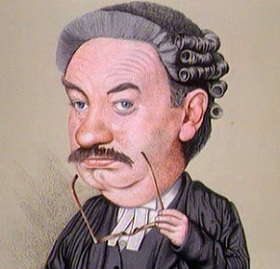
John Mortimer (21 april 1923 – 16 januari 2009)
Karikatuur van Leo McKern als Horace Rumpole
De Nederlandse schrijver Charles den Tex werd geboren in Box Hill, Australië, op 21 april 1952. Zie ook alle tags voor Charles den Tex op dit blog.
Uit: Het vergeten verhaal van een onwankelbare liefde in oorlogstijd (Samen met Anneloes Timmerije)
“Het is een vlucht van niks, nauwelijks iets te navigeren, Guus en zijn bemanning hebben de route al zo vaak gevlogen dat er geen verrassingen meer zijn. Het weer is goed, de kist ligt als een huis in de lucht en ze hebben geen afwijkende opdrachten of taken meegekregen. Drie passagiers ophalen met hun bagage en naar de basis brengen. Eenvoudiger kan bijna niet en toch voelt Guus zich niet echt lekker. Eenmaal op afstand van de stad geeft hij de besturing aan zijn Twee, die het dankbaar van hem overneemt. Zo kan Guus met de radio aan de gang om het afluistersysteem in te schakelen. Hij pakt de koptelefoon en nog voor hij hem kan inpluggen heeft hij moeite om gewoon te doen. Alles wat hij doet, elke handeling voelt vreemd, onecht, en het lijkt alsof dat op zijn voorhoofd geschreven staat. Als hij aan een knopje draait, weet hij zeker dat zijn Twee zich meteen afvraagt waarom hij dat doet. En waarom op dat moment. Kleine handelingen worden groter en zwaarder, alsof hij overdreven veel kracht nodig heeft om ze uit te voeren. Hij is ineens rillerig, koortsig, zijn lijf voelt alsof hij griep onder de leden heeft, slap en vervelend. Het liefst zou hij al die spullen onaangeroerd laten en een beetje onderuitzakken in zijn stoel. Waarom zou hij die mannen afluisteren? Dat is niets voor hem. Hij is een vlieger. Klaar. Hij huivert, weet dat hij geen keus heeft. In een andere situatie zou hij ervan kunnen afzien, misschien, maar niet nu. Hij moet. Met een kort gebaar schakelt hij de microfoon in, zet zijn koptelefoon af en klautert uit zijn stoel. Als hij wordt achtervolgd door een Zero of als er op hem wordt geschoten en de vonken van de romp af springen, weet hij wat hij moet doen. In een gevecht jaagt zijn hart hem voort en spannen zijn spieren zich tot ze keihard zijn. Dat is anders, fysiek. Nu niet. Afluisteren is stiekem en de spanning springt achter zijn ogen, verspreidt zich via zijn gedachten door zijn lichaam, tot in zijn tenen. Hij moet bewegen om de zenuwen doorgang naar de passagiersruimte.
De drie mannen zitten niet op de plek waar hij ze had verwacht. Ai, die mogelijkheid had hij van tevoren moeten bedenken. Ze hebben banken achterin uitgekozen waardoor de microfoon iets verder van ze vandaan hangt en bovendien de verkeerde kant op gericht is. Als hij hem kan draaien heeft hij nog enige kans iets van hun gesprek te horen. De bevestiging met het ijzerdraad is flexibel genoeg om hem met één beweging de andere kant op te draaien. Maar dan moet hij dat wel doen zonder er de aandacht op te vestigen.
Een van de mannen heeft een opengevouwen dossier op schoot. Op het moment dat hij nadert kijkt de man het nog één keer in, maakt een aantekening met een potlood en slaat het vervolgens dicht.”uit zijn ledematen te laten lopen.”
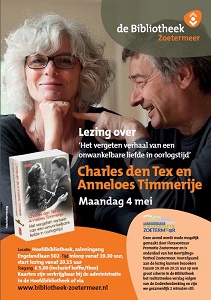
Charles den Tex (Box Hill, 21 april 1952)
Affiche voor een lezing
De Turkse dichter van Koerdische afkomst Ahmed Arif werd geboren op 21 april 1927 in Diyarbakır, Zie ook alle tags voor Ahmed Arif op dit blog.
Anatolia
I gave cradles to Noah
Swings,hammocks
I am Anatolia
Do you know?
I’m ashamed
I’m ashamed of being poor
Naked in everyone’s eyes
My seedlings gets cold
My blend is slack
Frienship,work,
Tie
Roses are open
In poet’s and scientist’s world
I stayed all alone
All alone and so far
Do you know?
I milked thousand years
They smashed with their horrible horsemans
My coy semiconscious sleeps
Rulers,attackers,bandits
They release extortion on me
I didn’t care İskender
I didn’t care Sultans
They passed away,shadowless
I said hi to my friend
Do you see ?
I wish you knew how I love
Köroğlu,
Karayılan,
Unknown soldier..
Pir Sultan and Bedrettin
Then the pen don’t write
A nice love..
I wish you knew
How they loved me
I wish you knew
Who bullet in Urfa
On Mosque,brricade
On cypress
How he laughed to die
I really want you to know,
Do you hear ?
Don’t be sad
Don’t be upset
Wherever you are
Inside,outside,in school,on desk
Walk onto
Spit on hangman’s face
Opportunist’s,factious’s
Hang on with book
Hang on with work
With claw,teeth
With hope,with love,with dream
Hang on don’t be expose me
See how can I create again
With your honest,young hands
There are my daughters
Sons on future
All of them a piece of an unforgiven world
The buds of thousand years
On your eyes,
I’ll kiss you on your eyes
I have my hope on you
Do you understand ?
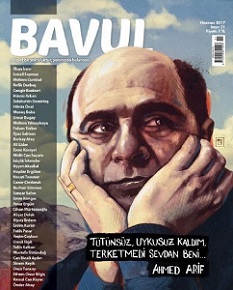
Ahmed Arif (21 april 1927 – 2 juni 1991)
Cover
De Duitse literatuurwetenschapper en musicus Michael Mann werd als jongste kind van Thomas en Katia Mann geboren op 21 april 1919 in München. Zie ook alle tags voor Michael Mann op dit blog.
Uit: Die Manns. Geschichte einer Familie (door Tilmann Lahme)
„Michael Mann ist im Juni nach Paris zurückgekehrt, nimmt weiter Stunden bei seinem Geigenlehrer Galamian. Von seiner musikalischen Ausbildung handeln die Briefe an die Mutter selten. Zwei andere Themen stehen im Mittelpunkt: seine Pläne für die Hochzeit mit Gret Moser; und Geld, das immer fehlt und in jedem Brief aufs Neue eingefordert oder erbettelt wird. Im August kehrt auch das große Thema des Vorjahres zurück: der Bugatti. Der Sportwagen muss schon wieder repariert werden, und dabei ist ein zusätzlicher cldfaut bemerkt worden: Die Spur ist völlig verzogen, die neuen Reifen (die er auf Pump gekauft hat) sind dadurch schon wieder abgefahren. Michael Manns Begeisterung für sein »Wunder« ist verflogen. Er schreibt der Mutter von Plänen, den Wagen zu verkaufen, er habe auch schon einen Interessenten. »Den Defaut verschweige ich ihm natürlich«. Natürlich. Und schon folgt der obligatorische Abschnitt über »so vieeele, viele schoiiissliche Uunk000sten«. Zehn Tage später braucht er wieder Geld. Sie solle bloß nicht denken, er mache laufend Schulden nach dem Motto: Die Mutter zahlt sie ohnehin. So sei das nicht. Er lebe eigentlich »garnicht unsparsam«. Nur: »wenn ich bloß nicht immer solch abscheuliches Miss- und Ungeschick hätte.“
(…)
Die Familie lebt nach wie vor in einem privilegierten Exil, aber doch in unsicheren Zeiten, auch finanziell längst nicht mehr so weich gebettet wie in früheren Tagen. Die Ausgaben sind hoch, und die Zahl derer, die von der Mutter regelmäßig Geld erwarten, wird nicht geringer. Am wenigsten von allen in der Familie hat Michael Mann die Lage erfasst. Der Mutter schickt er, nach all den Bettelbriefen dieses Jahres, einige Wochen vor Weihnachten seinen Wunschzettel für das Fest: Lederhandschuhe, Manschettenknöpfe, Hemden, Hosen, eine Lederweste, eine Joppe, Pantoffeln, einen Seidenpyjama, feine Taschen- und Halstücher, eine Notenmappe (eine »schöne«), einen Notenständer, ein Grammophon, einen Geigenkasten, ein elektrisches Metronom, einen neuen Füllfederhalter, eine Armbanduhr, ein Feuerzeug, »Soir de Paris« (ein Parfüm), einen arabischen Teppich, ein Zigarettenetui …“
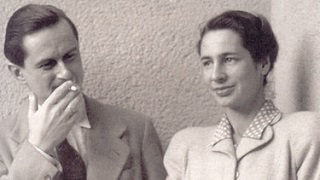
Michael Mann (21 april 1919 – 1 januari 1977)
Hier met echtgenote Gret in 1937
Zie voor nog meer schrijvers van de 21e april ook mijn vorige blog van vandaag.
